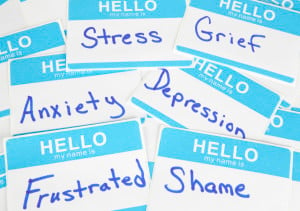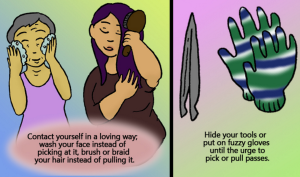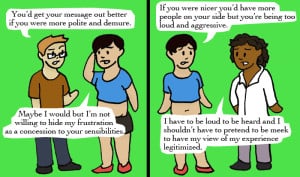As a woman, it’s taken me a long time to figure out what rights I have in relationships.
Like many women, I was trained by my family and culture to always put others’ needs first. I was taught that sacrificing my own wants and needs was a virtue, and that my adult identity should revolve around my romantic partner (and possible children). I was also taught to trust others’ judgment above my own, because I was automatically more “irrational” because of being a woman.
Most of these messages weren’t communicated directly, but indirectly in a thousand subtle expectations and microaggressions. They got through to me very clearly, nonetheless. So when I started dating, it took me a long time to realize how many of my basic personal rights I was giving up in my relationships.
The rights I’ve listed below are basic things that everyone should have in a relationship. Many of them are things that I found myself letting slip away in my early relationships, or things that I’ve seen many friends struggle with.
When we don’t have these basic rights, our sense of self is undermined. Instead of growing and developing in our relationships, we feel trapped and stunted. And in some cases, denying these rights is the first step in a pattern of abuse.
With a couple of noted exceptions, the rights I’ve listed below apply whether your relationship is casual or committed, monogamous or non-monogamous, asexual or sexual. If you are a submissive in a D/s relationship, you may choose to waive some of these rights, but you always have the right to renegotiate and take them back.
While these rights are valid for all people, women in particular often find them undermined in relationships, because of the way we’re socialized to prioritize others over ourselves. If you’re a woman who has romantic relationships, I strongly encourage you to read these over, internalize them, and stand up for them in every relationship you have.
1. I Have the Right to Express My Needs and Have Them Considered
A relationship sometimes means compromising between your needs and those of your partner(s), but you should always be able to say what you need and have your partner(s) consider how best to support you.
There’s a huge difference between “After talking it over and exploring different options, I don’t think I can do that for you” and “No, I’m not interested in expending my energy to support you.”
2. I Have the Right to a Balance of Give and Take
There are always times when one partner needs to support the other, whether it’s for an evening after a bad day, for a few days when one person is sick, or for months or years through a long-term illness or depression.
In general, though, times when you step up to support your partner should be balanced by times your partner steps up to support you.
Women in particular often find that they drop everything and silence their own needs when a partner is struggling. And then, when they’re having a hard time, that partner only makes tiny adjustments to take care of them (often while expecting lots of credit).
That’s unfair. You have every right to ask your partner(s) to step up for you in the same ways you step up for them, even if it takes some work and adjustment for them to learn how to do this.
3. I Have the Right to Make My Feelings Heard
Your feelings are your own responsibility, just like your partner’s feelings are theirs. But “it’s my responsibility” doesn’t mean “I have to deal with it all on my own.” Whether your feelings are rational or not, you have a right to voice them, and to be heard with compassion.
Women are often accused of being hysterical or unreasonable when they express feelings. This is sexist and false, and it’s a common way for their partners to justify not listening when a woman says how she feels.
It’s worth having a conversation about what you want when you express feelings: solutions, commiseration, just a listening ear? A caring partner will want to learn how to respond to your feelings in ways that help you feel better.
4. I Have the Right to Ask for Sexual Pleasure
If you are in a sexual relationship, you have a right to ask your partner for the things that will please and satisfy you. That doesn’t mean they have an obligation to do those things – they have a right to their boundaries and dislikes. But you always have a right to ask and to explore compromise.
Often women in relationships focus on their partner’s pleasure and ignore their own. Some men who date women will act as though their partner is being demanding and unreasonable when she asks for something that will satisfy her.
She’s not – she has just as much right to ask for the sex acts that please her as he does.
5. I Have the Right to Set Sexual Boundaries and Have Them Respected
There is no circumstance in a relationship that takes away your right to set boundaries: from “I don’t want to have sex that way today” to “I don’t want to have sex at all.” It doesn’t matter how long you’ve been together, and it doesn’t matter how much they’ve done for you. You get to how and when your body will be touched.
If your partner sulks, argues, or pressures you when you set boundaries, that is sexually coercive and not okay. If your needs and boundaries are very different, you may need to change something about your relationship (or even end it), but this discussion should always be respectful and free of guilt-tripping.
6. I Have the Right to Make Informed Decisions About My Sexual Safety
You have the right to ask and receive honest answers about things that affect your sexual safety. This includes other people your partner is having sex with or making out with, any STIs your partner knows they have, and when they were last tested.
There are different norms and expectations around things like “When is a relationship sexually exclusive?” or “How often do you get tested?” So I don’t recommend making any assumptions until you’ve had a conversation. But your partner should answer honestly any questions you ask, and once you’ve made agreements and shared information about your sexual health status, your partner has an obligation to tell you if anything changes.
If your partner prefers to keep information about their sexual health or other partners private, they have the right to do this, but then they shouldn’t make you feel bad if you decide not to have sex with them for safety reasons.
You get to set your own comfort and risk level.
7. I Have the Right to Interests and Relationships Outside My Partnership
The rest of your life doesn’t go away when you get into a relationship. While the balance of time you spend on things may shift, you still get to maintain your friendships, family relationships, interests, and activities.
A partner who complains when you see your friends or belittles the interests you have that they don’t share might just be very insecure or have some learning to do about boundaries. Or it could be a precursor to abusive and controlling behavior.
Either way, you have the right to a life outside your relationship – and a partner who supports this.
8. I Have the Right to Be Consulted on Decisions That Affect Me
For partners who live together, consider themselves highly committed, and/or share finances, decisions about big lifestyle questions should be made with the input of both/all partners.
Even if it is primarily your partner’s decision to make, like whether to stay in their current job or look for a new one, they probably owe you a discussion about how this will affect you both before handing in their notice.
Even if you’ve agreed that one partner will make the decisions in a certain area, you always have the right to renegotiate that agreement if you want to be more involved.
In less entwined relationships, you should still each have the same level of independence and accountability about decisions you make. If your partner can take a two-week vacation alone without telling you, but gets mad when you plan a weekend away, that’s a bad sign.
9. I Have the Right to Be Shown Respect by My Partner – Both in Private and in Public
You can disagree, you can find things about each other irritating, but in a respectful relationship, your partner will not mock or belittle you in a way that you find hurtful. They will not act like they’re ashamed of you or put you down in public. They will treat you like an adult and an equal, not like a child or an employee.
Sometimes a partner teases because they feel awkward, or because they think it’s fun for both of you, but if you tell them that it’s hurting your feelings and ask them to stop, they should listen.
Sometimes a partner tries to micromanage your life or give you orders because they think that’s how to be helpful, but if you tell them you don’t want that level of input, they should back off.
10. I Have the Right to Grow and Change
Nobody is the same person at forty that they were at twenty – thank goodness!
Healthy long-term relationships grow and change right along with the people in them, finding new ways to connect when old ones don’t work any more. But often, people feel threatened when their partner starts changing in significant ways, and try to pressure them into staying the same.
Some changes may have major impact on a relationship, like a change in religion or sexual identity. And sometimes these changes mean that you’re no longer compatible with your partner.
It’s okay for them to feel hurt, confused, sad, and even angry.
But it’s not okay for them to act like you’ve done something wrong, or to try to force you to stay stagnant and repress yourself for their sake.
11. I Have the Right to Feel Safe in My Home
Your home is your physical safe space. You should not have to go about your own home worried about what your partner might do to you. Even if they haven’t been directly violent toward you, if they throw things, punch walls, or make threats, and you’re left feeling afraid, that’s not okay.
If you don’t live together, you have the right to set boundaries on when your partner gets to be in your home. Showing up at your doorstep when you’ve asked them not to, or using their spare key to get in uninvited, are boundary violations.
You may need to talk to make sure they understand what your boundaries are around them coming over, but once you’ve communicated it, they need to respect it.
12. I Have the Right to End a Relationship That Isn’t Making Me Happy
Most relationships have their rough patches, and it’s a good idea to work on conflict management, compromise, and flexibility together. But at the end of the day, if your relationship isn’t making you happy, you have every right to end it.
You don’t need a big reason or excuse: “I’m not happy” is enough.
If your lives are deeply intertwined, and especially if you have children or if your partner is dependent on you, the transition may be complicated, and you may need to maintain some kind of relationship, at least for a while.
But you always have the right to decide not to be romantically or sexually involved with someone any more, and you don’t have to answer to anyone for your reasons.
***
Standing up for all of these rights does not make you unreasonable, demanding, or too picky – and anyone who tells you differently has probably internalized some pretty crappy messages about what women are worth.
The truth is, you deserve all these things as a bare minimum in your relationship.
If you’re realizing that you’ve let some of these rights get overridden in your relationships, don’t blame yourself. Standing up for ourselves is really hard and takes a lot of practice. I’m still working on it, and I couldn’t do it without the help of supportive friends and my lovely therapist.
Reading lots of books and articles about self-empowerment, talking with a counselor, and getting perspective from friends who are good at standing up for their needs are all good ways to develop this skill.
Good luck! You deserve it.
[do_widget id=’text-101′]
Ginny Brown is a Contributing Writer for Everyday Feminism, as well as a speaker and educator specializing in sexuality and relationships. She writes for various publications and has her own blog here. She lives in the Philadelphia area with her poly family and three cats. Follow her on Twitter @lirelyn.
Search our 3000+ articles!
Read our articles about:
Our online racial justice training
Used by hundreds of universities, non-profits, and businesses.
Click to learn more





















